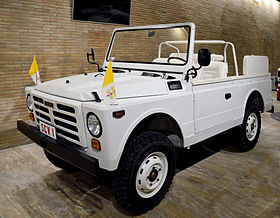Fiat Campagnola
| Fiat Campagnola | |
|---|---|
 |
|
| Overview | |
| Manufacturer | Fiat |
| Also called | Zastava AR51/AR55 |
| Production | 1951-1973 |
| Dimensions | |
| Wheelbase | 225 cm (88.6 in) |
| Length | 360 cm (141.7 in) 403 cm (158.7 in) |
| Width | 148 cm (58.3 in) |
| Height | 195 cm (76.8 in) |
| Curb weight | 1,250 kg (2,760 lb) -1,350 kg (2,980 lb) |
| Fiat Nuova Campagnola | |
|---|---|

Fiat Campagnola as Popemobile in which Pope John Paul II was victim of the assassination attempt. This vehicle is now in the "Carriage museum" of the Vatican City.
|
|
| Overview | |
| Manufacturer | Fiat |
| Also called | Renault TRM500 |
| Production | 1974-1987 |
| Dimensions | |
| Wheelbase | 230 cm (90.6 in) |
| Length | 378 cm (148.8 in) 403 cm (158.7 in) |
| Width | 158 cm (62.2 in) |
| Height | 195 cm (76.8 in) |
| Curb weight | 1,750 kg (3,860 lb) |
The Fiat Campagnola is a heavy-duty off-road vehicle produced by Fiat. Production started in 1951 and it was upgraded in 1974.
Since 1975 it has been delivered to every Italian armed service in many versions with standard or long wheelbase and canvas or hard top.
The Campagnola was redesigned for launch in June 1974 and in this form produced until 1987.
The new vehicle used the petrol engine of the Fiat 132, but with a longer stroke which increased the capacity to 1,995 cc. - the same enlarged engine turned up in the Fiat 132 itself two years later, albeit with twin overhead camshafts. There was a light alloy cylinder head: instead of the twin overhead camshafts of the 132, the engine in the Campagnola had a single side-mounted camshaft driven by a toothed belt, the valve movement being driven by pushrods and rockers. The large square engine compartment gave easy access to the engine bay which was designed to permit "wading" up to 70 cm deep.
The 57 litre fuel tank was positioned well out of range from rocks and flying stones, being under the twin passenger seat beside the driver.
MacPherson struts suspended all four wheels, with two struts for each of the rear wheels and a single strut for each of the front wheels. All six struts used were of identical specification and thereby interchangeable. Road testers from the UK commended the smoothness of the ride over rough ground which evidently compared very favourably with that offered by the Land Rover of the time.
A military version was introduced in 1976 (AR76) and 1979 after new updated it was called AR76.
The “Campagnola” of the Distaccamento Aeroportuale di Ronchi dei Legionari is in the standard wheelbase hard top version. The vehicle is 3.775 metres (148.6 in) long, 1.580 metres (62.2 in) wide and 1.945 metres (76.6 in) high. The wheeltrack is 1.365 metres (53.7 in) and the wheelbase is 2.300 metres (90.6 in). The minimum ground clearance is 0.27 metres (10.6 in).
The powerplant is a Fiat 4-cyl gasoline engine developing 59 kW (79 hp) at 4600 rpm through a 4X4 transmission. The suspension system is independent on all four wheels.
Basic performance data include a 120 km/h (75 mph) maximum speed, a 56° gradeability (150%) and a maximum fording depth of 0.700 metres (27.6 in).
...
Wikipedia
